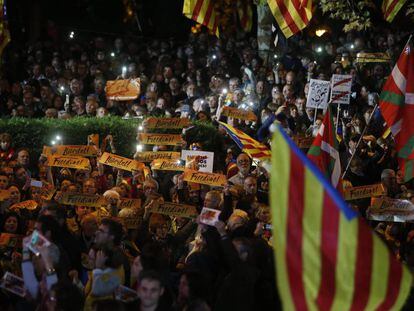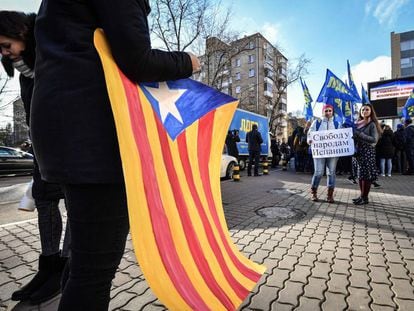Colau, the opportunist
The mayor of Barcelona has positioned herself on the side of those who cause division, at the expense of her city

If we are to believe the official reason given by the mayor of Barcelona, Ada Colau, to justify her breaking off the alliance in the City Council with the Catalan Socialist Party (PSC), it would be enough to call into question what is evident: under no form of democracy should 2,059 votes from party members have the power to cause such instability within the great urban power of the Mediterranean, a city that until recently was the Hispano-American publishing capital, one with a very good chance of becoming home to the European Medicines Agency, and that is the headquarters of the Mobile Congress conference, to name but a few of the areas in which Barcelona radiated huge capacities of attraction and dynamism, and that are coming to nothing given the growing unrest.
But those 2,059 members of Colau’s party who voted against this partnership in the city council do not have great importance, because the real reasons for the mayor and Barcelona en Comú’s decision are more to do with electoral opportunism and polarization with little more than a month to go until the regional elections in Catalonia. Even within the party’s own ranks the decision to consult the grassroots supporters about continuing the partnership with the PSC has been classed as a “sideshow of demagoguery.”
Colau has forgotten that the biggest responsibility of a political leader is the general interest, and not the individual
Hiding behind those 2,059 party members and without having made a statement about it herself, Colau has forgotten that the biggest responsibility of a political leader is the general interest, and not the individual.
During the Catalan secessionist challenge, Mayor Colau has been playing a game of contradictions. She has defended the illegal October 1 referendum at the same time as calling for its results not to be recognized. She has joined protest marches calling for the release of “political prisoners” who are no such thing. She has been unable to clarify whether the Catalan republic already exists or whether Carles Puigdemont is still the regional premier, when the speaker of the region’s parliament, Carme Forcadell, has already made the answers to these questions clear. And now, this latest move has taken an irresponsible step toward instability, making the Catalan economy more fragile, and pitting citizens against one another.
Colau has broken the pact between the parties – one that kept non-local issues strictly on the sidelines – and has done so in apparent punishment for the PSC’s support for the invocation by the central government of Madrid of Article 155 of the Constitution, which has seen the region’s powers of autonomy suspended. The reality is that she wants her party to play a relevant role in the December 21 regional polls, with a possible coalition with the Catalan Republican Left (ERC) given the likely collapse of former regional premier Carles Puigdemont’s PDeCAT party. For that objective she is willing to sacrifice everything else.
Colau has taken an irresponsible step toward making the Catalan economy more fragile, and pitting citizens against one another
The expectations of each party ahead of December 21 are a work in progress right now, but between the more resounding position of the pro-Constitution Popular Party (PP) and Ciudadanos, the legitimate aspirations of the PSC to regroup moderate anti-independent Catalanism and those who survive the pro-secession front that has governed Catalonia until now, Ada Colau’s party is aspiring to occupy a space that is sufficiently ambiguous in nationalist terms to attract votes from disappointed Junts pel Sí supporters, but who are in favor of the right to decide, and Catalanists who could opt for the Socialists.
In the coordinates that are currently dividing politics in two in Catalonia, between pro-independence and pro-Constitution voters, Colau has positioned herself in favor of the former, instead of on one side of the line that separates left and right. And above all else, she has assumed the attitude of those who would see coexistence shattered, doing away with pacts with other parties at the cost of the citizens of Barcelona and the economic stability that Catalonia needs. Forgetting that she counts on just 11 of the 41 city councilors, she is embarking on an electoral drive and putting it above the general interest. It’s an own goal for the new politics.
English version by Simon Hunter.












































